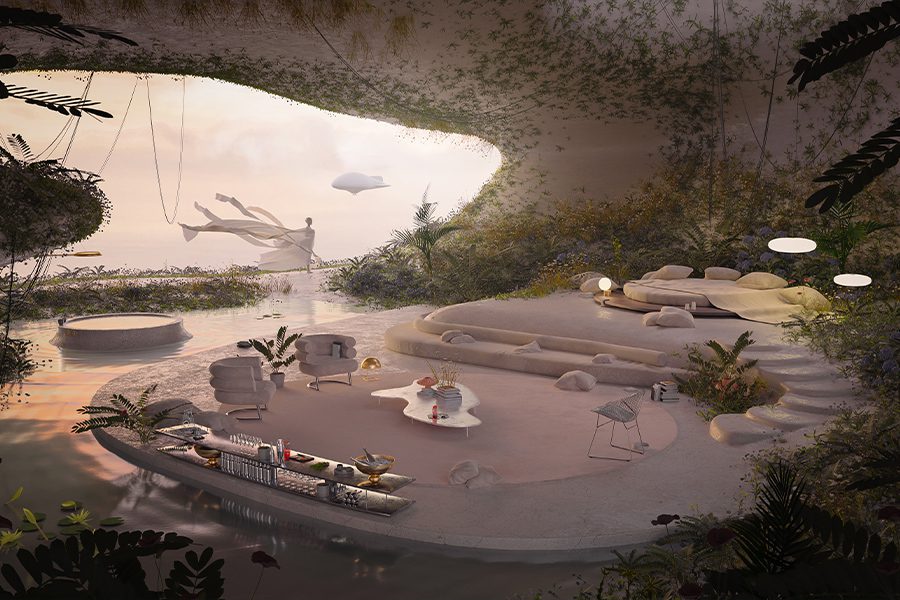The new frontier of design is happening in the metaverse, a term loosely defined as cyberspace or the internet in 3D. Known as Web3, the space has given companies the freedom to think beyond the physical world and work with technologies, including virtual and augmented reality, that marry our reality with a digital one. Despite its nascency, the benefits of entering the metaverse may outweigh its detractors, offering us a chance to build more empathetic, equal, and inclusive communities.
Consider citizenM, which is the first hotel group to purchase LAND in the Sandbox, a piece of digital real estate on the Ethereum blockchain (the hotel is financed by 2,000 tokens exchangeable for real-life stays). The virtual destination will not only showcase and sell future non-fungible tokens (NFTs) commissioned by emerging talent in the digital art world, but it will be financed through the sale of an exclusive NFT collection. (NFTs are a unique blockchain code linked to a digital asset that can be bought, sold, and traded online using either crypto or traditional currency.)
CitizenM also plans to direct profits from these sales to fund a real-world hotel in a location voted on by the NFT holders, creating a getaway for the people and by the people. “The metaverse is a further acceleration of a dynamic that’s been emerging for years, in which our digital and real lives blur,” explains Robin Chadha, citizenM’s chief marketing officer. “This is a dynamic that the traditional hotel industry doesn’t adequately address. It’s our responsibility to meet our guests where they are.”

In April, citizenM became the first hospitality brand to buy property in the Sandbox
NFTs were initially created to represent real-life objects in virtual worlds such as Decentraland, Sandbox, Bapesworld, and even Second Life, the metaverse where Starwood launched the Aloft brand back in 2006. NFTs have also become popular for providing proof of ownership for digital art.
The same principle can apply to the ownership of digital architectural, interior, and product designs. Economist and financial analyst Adonis Zachariades cofounded Renovi, a company that creates architectural NFTs and aims to become the one marketplace where architects sell their designs across all metaverse platforms. “Someone needs to take a stand for the architects,” he says. “We want to create a space where they can share ideas and collaborate. Architects already use the tools required for the metaverse.” With the help of a number of trusted external advisors, including his brother Stavros Zachariades, who supports as Renovi’s senior architectural advisor and is an associate architect at London-based Squire & Partners, Renovi currently has around 200 NFTs, and during Decentraland’s first-ever Fashion Week, it brought brands like DKNY and Diageo to life.
While hotels in the metaverse may be an expensive marketing tactic, next-generation utility NFTs offer tangible rewards to their owners—and hospitality brands—by bridging real and virtual worlds. Web3 consultancy Connecting Roads draws on its experience in glamping, luxury hotels, and music festivals to create NFT-led programs that strengthen community loyalty. “With NFTs, we can continuously reward and surprise people with upgrades, unlockable content, and incentives for future experiences,” says cofounder Dylan Barahona. Token holders receive membership benefits such as priority access, exclusive events, and smart digital tickets that cannot be counterfeited since they use uncrackable blockchain technology.

As part of Metaverse Fashion Week, Diageo commissioned Renovi to create ‘Taste of the Future’ for people to learn about beverages, meet fellow enthusiasts, and interact with the brand
Other hotel properties are taking advantage of this new technology, as well. Manhattan’s NoMo Soho, for instance, is selling NFTs redeemable for three-to six-night visits and upgrades. NFT art options include the Lovewall in NoMo Kitchen and the Tunnel of Love, the hotel’s iconic main entrance archway. Dream Hotel Group recently launched NFT galleries showcasing more than 70 digital displays in the lobby spaces of Dream Hollywood and Dream Downtown in New York. A partnership with the Crypt Gallery, it “really transformed the whole area,” says Kat Kim, vice president of creative at Dream Hotel Group. “It sparked this whole new community of people to engage with that space. Because of that, we’re now launching a membership club that is going be sold with an NFT in the metaverse.”
InterContinental Hotels & Resorts is also getting into the space, with a gallery all its own—10 exclusive NFTs in collaboration with British artist Claire Luxton that showcase vibrant scenes of flora and fauna inspired by hotels in the company’s portfolio. NFT ownership also includes InterContinental Ambassador status and a one-night stay at the new InterContinental Rome Ambasciatori Palace, opening in 2023.

The Dream Hollywood hotel displays digital NFT works in its lobby
Further, lifestyle hotel brand LEVEN will also stake its claim in the metaverse this fall through a new partnership with investment vehicle Branco Capital. The brand, whose maiden physical property debuted in Manchester, UK last year, will introduce its virtual hotel in the Fashion Street Estate of virtual world Decentraland. “We see an opportunity in the metaverse to connect with new audiences and bring together like-minded people in a space created with LEVEN’s values in mind,” says cofounder Timothy Griffin. The LEVENverse hotel will embody an organic form as if carved by the wind to provide numerous openings across public spaces and accommodations. “You experience everything that makes the real-life LEVEN special,” he says, “but supersized: inspiring design, unexpected moments of whimsy, and opportunities to make meaningful connections.”
Ken Patel is the founder and chairman of the EV Hotel Corporation, a crypto and technology hotel brand that leans into innovation and technology to make things easier for guests and employees. Debuting February 2023, the inaugural Evolution Venue (EV) Hotel with a digital version in Bapesworld will replicate some features of the physical Phoenix property designed by New York-based architect Mancini Duffy and Atlanta-based interiors practice Sims Patrick Studio. “We have to match innovation to technology,” Patel says. “People get confused and think technology is going to replace humans. Technology doesn’t replace humans. We’re creating innovation that lessens the task for the employees.”

EV Hotels is partnering with the crypto exchange to develop a trade floor, dubbed the crypto ballroom, inside its properties
NFT holders will receive perks like free stays and food, as well as access to the crypto ballroom, a partnership with the crypto exchange (similar to the New York Stock Exchange) that will create the first-ever trade floor inside the hotel that allows guests to buy, sell, and trade crypto. “Bringing together the hospitality, crypto, and NFT worlds is definitely coming, so will you get onboard now, or in two to three years, will you ask yourself why you waited?” Patel asks.
“The metaverse,” he says, “is going to change lives.”
This article was originally published in September 2022 and updated January 2023.



